Sickle Cell Anemia is a severe blood disorder in which red blood cells become abnormal in shape and lose their ability to supply oxygen throughout the body.
In mild cases, Sickle Cell Anemia treatment requires medication and blood transfusions.
In rare cases, it may need a bone marrow transplant.
Popular Cities in United Arab Emirates for Sickle Cell Anemia Treatment are:
The right doctor to consult for Sickle Cell Anemia is a Hematologist who specializes in treating blood disorders.
Listing popular specialists:
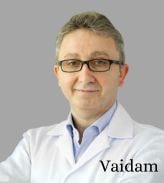
Senior Consultant, 25 years of experience

Treatment of Thalassemia and Sickle cell anemia, Bone Marrow Transplantation, Hematological diseases
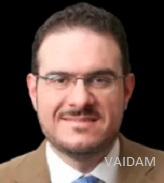
Consultant, 16 years of experience

Leukemia Cancer
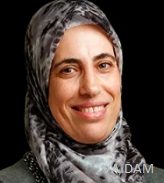
Senior Consultant, 20 years of experience

Benign and malignant blood diseases
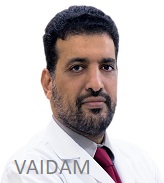
Consultant, 15 years of experience

Anemia, Blood Clots, Bleeding Disorders, Lymphomas, Leukemia, Myelomas
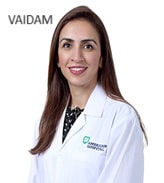
Consultant, 16 years of experience

Multiple Myeloma and Amyloidosis, Acute Myeloid Leukemia, Acute Lymphoblastic Leukemia, Chronic Myeloid Leukemia, Chronic Lymphocytic Leukemia and other chronic leukemia, Hodgkin Lymphoma, Non-Hodgkin Lymphoma, Anemia, Thrombocytopenia, Polycythemia, Autoimmune Blood disorders, Bone Marrow Transplantation, Hemophilia
With improvements in diagnosis and medical care, the success rate of Sickle Cell Anemia is above 95%.
Some symptoms of Sickle Cell Anaemia may include -
Our Services for Sickle Cell Anemia Treatment in United Arab Emirates
Transparent - Professional - Without Hassles
Sickle cell anemia is an inherited red blood cells disorders in which the red blood cells are not healthy enough to carry oxygen through the body, red blood cells can easily move throughout the blood vessels.
can get sickle cell anemia from when you inherit sickle cell from both your parents. When both your parents are carriers of sickle cell gene then you can get sickle cell anemia.
The organs affected by sickle cell anemia are the liver, heart, kidney, gallbladder, eyes, bones and joints. It can cause recurrent infections, symptoms of sickle cell anemia usually appear 5 months of age. Some of the symptoms of sickle cell anemia includes anemia, episodes of pain, swelling in hands and feet, fever, pale skin, frequent infections etc.
If both mother and father are carrier then child may get affected from sickle cell anemia.
Complications of sickle cell anemia includes stroke, acute chest syndrome, pulmonary hypertension, organ damage, blindness, ulcers in leg, gall bladder stone and pulmonary hypertension.
Sickle cell anemia is being diagnosed by blood test, blood test checks for the defective form of hemoglobin causes sickle cell anemia. Adults and children can also be tested or sickle cell anemia.
Sickle cell anemic avoids the episodes of pain, relieves the symptoms and prevents complication. The treatment of sickle cell anemia included medications and blood transfusion.
The surgical procedure of sickle cell anemia involves blood transfusion, in red blood cell transfusion red blood cells are being removed from the supply of donated blood. This increases the supply of red blood cells.
Blood transfusion takes around 90 to 120 minutes to be completed and it can even be done in smaller children who are younger than 5 years.
The process of stem cell transplant usually takes around 3 weeks to be done.
Stem cell transplant is also known as bone marrow transplant the process of stem cell transplant involves replacing the bone marrow of the affected person with the healthy bone marrow of the donor.
Stem cell transplant involves long hospital stay, after getting transplant you will need to get drug for preventing rejection of the donated stem cells. In some cases, your body may reject the transplant which may result in some life-threatening complications.
If you have sickle cell anemia by seeing a genetic counselor before you trying to conceive will help you in understanding the risk of having a child with sickle cell anemia.
Red blood cells usually live for about 120 days before they need to be replaced. But sickle cells usually die in 10 to 20 days, leaving a shortage of red blood cells,.






NABH Certified Healthcare Discovery Platform
Vaidam is NABH certified healthcare discovery platform that will connect you to top-notch medical experts, hospitals, wellness options, and trusted travel partners to help identify and make the right healthcare choices.

Researched & Personalized Treatment Plan - Under One Roof
You can search for the best hospitals, read about them, view photographs of the facilities at the hospitals and the places at which the hospitals are located, and check the cost of treatment.

Quality Treatment Within Your Budget
As soon as you post an enquiry, the patient relation team will collect details from you, share them with the doctors and hospitals on Vaidam's panel, and get a personalized treatment plan. We research to get quality treatment within your budget.

Treatment to Travel
Vaidam concierge assists patients, to get medical Visa, the best airline fares and arrangements for your stay. Our concierge also helps you with daily travel, language, and food concerns. Vaidam does everything to be your perfect host. All of Vaidam’s services are free of cost to patients.

International Reach
Vaidam Health has network in 15+ countries, which includes India, Turkey, UAE, Germany, South Korea, Thailand, Malaysia, Spain.
Note: Vaidam Health does not provide medical advice, diagnosis or treatment. The services and information offered on www.vaidam.com are intended solely for informational purposes and cannot replace the professional consultation or treatment by a physician. Vaidam Health discourages copying, cloning of its webpages and its content and it will follow the legal procedures to protect its intellectual property